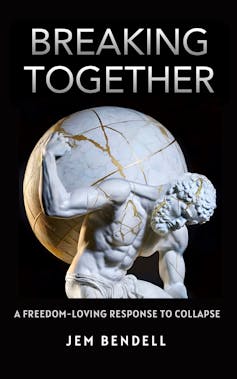if the world's systems are 'already cracking' due to climate change, is there a post-doom silver lining?
- Written by Tom Doig, Lecturer in Creative Writing, The University of Queensland

Heard about the guy who fell off a skyscraper? On his way down past each floor, he kept saying to reassure himself: So far so good … so far so good … so far so good …
If it felt to you like things started going off the rails around the year 2016, you’re not alone. Symbolically, the double blow of Britain voting for Brexit, then the United States voting for Donald Trump, seemed like the “end” of something. (The postwar liberal consensus[2]? The Anglo-American order[3]?)
For some – myself included – it also felt like the stirrings of a more explicitly dystopian moment. If you count yourself in this category, buckle up: Jem Bendell, former professor in sustainability leadership at the UK’s University of Cumbria, and his research team are here with more bad news.
According to Bendell’s new book Breaking Together: A Freedom-Loving Response to Collapse[4], “the quality of life in most countries and regions of the world […] peaked around 2016 and [then] began to slowly decline”. There is no sound reason to expect a halt to this deterioration, Bendell argues.
Rather, declining Human Development Index[5] statistics are one of many signals societal collapse due to climate change is not only possible, or even imminent – but already happening, right now.
But what if collapse is an ongoing and slow(ish) process, rather than a one-off mega-disaster? And what if the cracks appearing in the “cultural cement” of modern society represent not only a crisis, but also an opportunity to radically rethink how humans interact – with each other, and with the natural world?
Breaking Together encourages us to think about collapse in ways that are profound, possibility-expanding and startlingly original. Bendell’s “post-doom” perspective has the potential to change individual lives, upend organisational strategies and give birth to whole new social movements.
Bendell advocates for an ideal of “ecofreedom[6]”. This moves beyond obvious ideas, such as reconnecting with nature, to encompass supporting youth climate activism and decolonial, resource-preserving movements in the Global South.
The post-doom approach also calls for embracing a “positive disintegration” of self and values, to refocus one’s mind, and entire existence, on things that really matter.
Read more: We live in a time of 'late capitalism'. But what does that mean? And what's so late about it?[7]
Deep adaptation
Bendell is best known for his 2018 paper Deep Adaptation: A Map for Navigating Climate Tragedy[8]. He submitted it to the Sustainability Accounting, Management and Policy Journal[9] for peer review; the reviewers requested major changes.
Instead, Bendell published the paper himself, via the University of Cumbria’s Initiative for Leadership and Sustainability[10]. Deep Adaptation is a brick hurled through the window of “corporate sustainability”, questioning its very viability as a field of scholarship. The first sentence of the abstract reads:
The purpose of this conceptual paper is to provide readers with an opportunity to reassess their work and life in the face of an inevitable near-term social collapse due to climate change.
Needless to say, this got people’s attention. The breaking-the-frame gesture of a supposedly sober academic paper containing bold, sometimes alarming claims resonated widely. Particularly this one:
when I say starvation, destruction, migration, disease and war, I mean in your own life. With the power down, soon you wouldn’t have water coming out of your tap. You will depend on your neighbours for food and some warmth. You will become malnourished. You won’t know whether to stay or go. You will fear being violently killed before starving to death.
Deep Adaptation went viral. By 2019, it had been downloaded more than 600,000 times[11]. The argument’s appeal is based, first, on Bendell’s courage to draw meaningful, personally relevant conclusions from all the terrifying climate and ecological data that has been floating around unsynthesised for years.
















